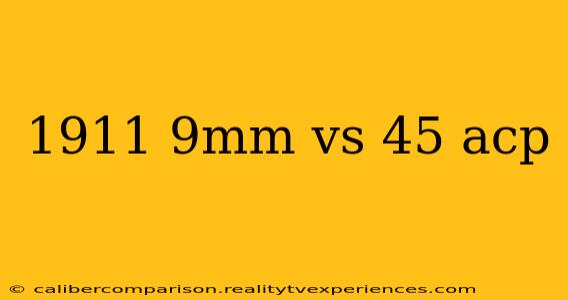The 1911 pistol, a legendary firearm, is available in various calibers, but the debate between the 9mm and .45 ACP versions often sparks passionate discussions among firearms enthusiasts. This in-depth comparison will analyze the ballistics, ergonomics, and practical applications of each caliber to help you determine which 1911 best suits your needs.
Ballistics: Power and Capacity
The core difference lies in their ballistics. The .45 ACP, with its larger diameter and heavier bullet, delivers significantly more stopping power. Its larger profile creates a larger wound channel, potentially leading to faster incapacitation. However, this power comes at a cost: reduced magazine capacity. Standard .45 ACP 1911s typically hold 7 rounds, while 9mm 1911s can hold 8 to 10 rounds, providing a considerable advantage in a self-defense situation where multiple shots might be necessary.
9mm Advantages:
- Higher Capacity: More rounds per magazine translate to more shots before reloading.
- Reduced Recoil: The lighter recoil allows for faster follow-up shots and improved accuracy during rapid firing.
- Lower Cost Per Round: 9mm ammunition is generally cheaper and more readily available than .45 ACP.
.45 ACP Advantages:
- Greater Stopping Power: The larger bullet diameter and weight deliver more kinetic energy, potentially resulting in a quicker incapacitation of a threat.
- Penetration: While debatable and dependent on bullet type, the .45 ACP generally offers better penetration through barriers.
Ergonomics and Handling
Both calibers, when housed in a 1911 platform, offer similar ergonomics, retaining the classic 1911 grip angle and single-action trigger. However, the recoil characteristics significantly impact the shooting experience.
The lighter recoil of the 9mm makes it easier to control, especially for newer shooters or those with smaller hands. The .45 ACP's heavier recoil necessitates a firmer grip and more deliberate trigger control. This doesn't necessarily make the .45 ACP inferior; many experienced shooters prefer the feedback and controlled recoil of the .45 ACP. It's more about finding the right fit for your individual shooting style and experience level.
Practical Applications
The choice between a 9mm and .45 ACP 1911 often depends on the intended use.
-
Self-Defense: For self-defense, the higher capacity of the 9mm offers a significant advantage, allowing for more shots in a potentially life-threatening situation. However, the greater stopping power of the .45 ACP remains a compelling argument for some. Ultimately, the best choice depends on individual preferences and training.
-
Concealed Carry: The slightly smaller size and reduced recoil of some 9mm 1911s might make them preferable for concealed carry. However, the substantial stopping power of the .45 ACP could be a decisive factor for those prioritizing incapacitation.
-
Competition Shooting: In competition shooting, the 9mm's reduced recoil and higher capacity usually make it the preferred choice for faster target acquisition and higher scores.
Conclusion: The Best Choice for You
There is no universally "better" choice between a 9mm and .45 ACP 1911. The optimal caliber depends entirely on your individual needs, shooting experience, and intended application. Consider the factors discussed above—ballistics, ergonomics, and practical applications—carefully to make an informed decision that aligns with your specific requirements and preferences. Spend time at a range renting both to get a feel for each before making a purchase. Remember that proper training and practice with any firearm are crucial for safe and effective use.

